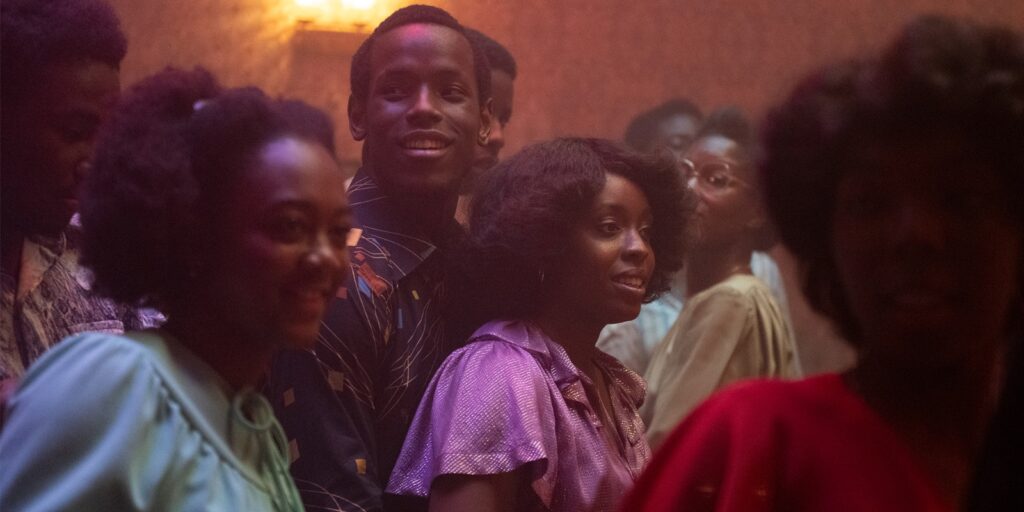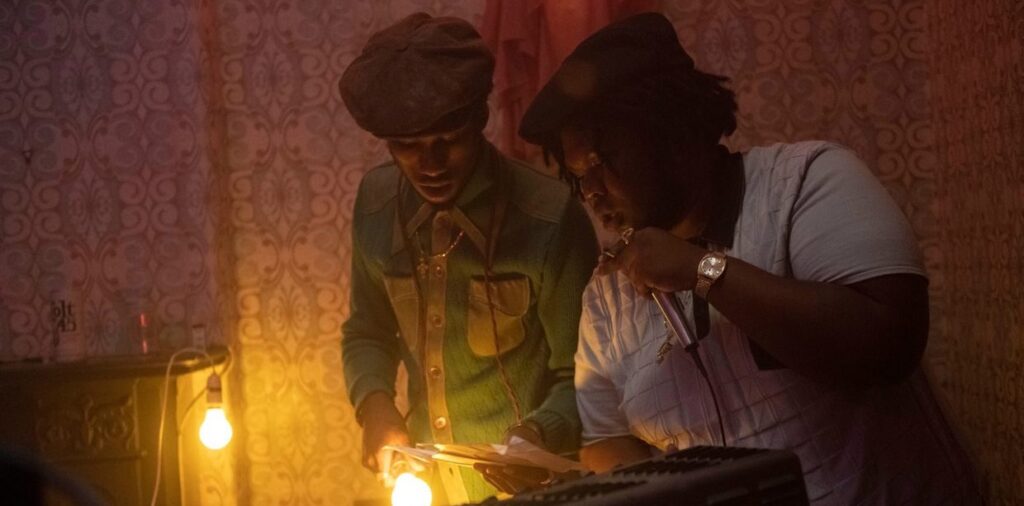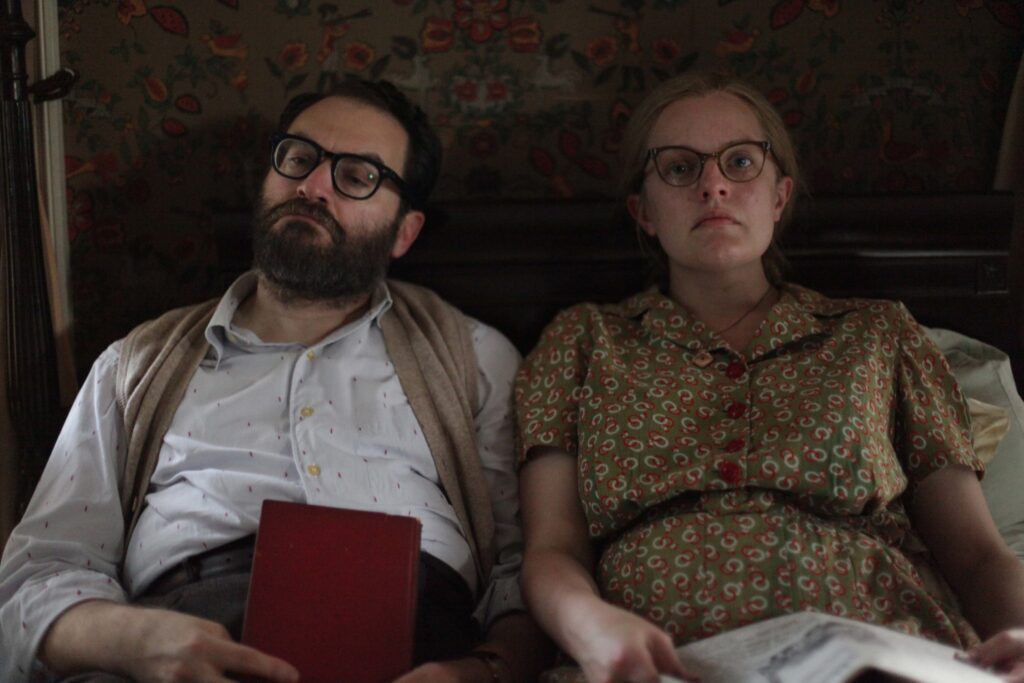My last day of writing about the London Film Festival has certainly instilled a bittersweet feeling within me. Not that I’ll be missing writing about several films a day; I am looking forward to spending the immediate future finishing my dissertation (“looking forward” being very generously applied here) or stepping away from the plethora of films I saw this year, some of which I was unable or uninterested in writing about. But with this final selection of films, all in some respects about social outcasts navigating an often inhospitable status quo, I had to bid goodbye to this year’s selection with a quiet degree of satisfaction in knowing that, regardless of when a film is screened, there’s always the potential for a truly great film to reveal itself at LFF.

Case in point, the cinematic transformation of the human body into a polyvalent conduit for black joy provides the irrepressible electricity of Steve McQueen’s Lovers Rock [4.5/5], his second film to be featured in LFF this year. Where Mangrove was a well-crafted biopic, this episode of McQueen’s Small Axe limited series is sixty-eight minutes of unfettered sensuality. Compared with Shame, McQueen’s grimly icy depiction of sex addiction, the tactility of bodily contact in Lovers Rock produces one of the most genuinely sexy films I’ve seen in some time, despite the fact that not one person ever removes their clothes.
The film’s plot is elemental in its simplicity as we spend a single night at a house party in London circa the early 1980s. The opening passages of party prep have DJs hauling furniture out of an upstairs room while women cook in the kitchen downstairs. Names of characters, like lead DJ Samson (Kadeem Ramsay) and 17-year old tenant Cynthia (Ellis George), who will reappear throughout the film briefly flit in the air. But McQueen’s unhurried, practically relaxed pacing establishes within this subset of the West Indies British community his dominant aim for dwelling within a bygone milieu. Although McQueen’s vision of the past is not entirely nostalgic, the extended dance scenes of bodies passing and colliding with one another resonate with acute poignancy in 2020.
Much of the film is, indeed, set on the dance floor, awash in a sea of faces we come to familiarize ourselves with, even if we know the names of only a handful of partygoers. One of them, Martha (Amarah-Jae St. Aubyn), has snuck out from her house to spend the night dancing with her friend, Patty (Shaniqua Okwok). Yet the latter, feeling disenchanted by the vibe, abruptly splits the scene, leaving Martha alone to dance with Franklyn (Micheal Ward). The two flirt in brief exchanges, yet their courtship blossoms on the dance floor. Men crowd to the side early in the night while women often dance to reggae, as well as mainstream pop staples like Kung Fu Fighting. Observation and presentation converge in derisive whispers, like Cynthia’s jealous dismissal of Martha’s dress, yet they also infuse the playful anticipation undergirding the moments before the first suitor takes to the dance floor.

As the ritualistic element of the dance proceeds, the camera begins bobbing and weaving through the crowd as arms touch elbows, hands rest on thighs, and shoulders loom large, strong and steady. This fusion of bodies plays out against two renditions of Janet Kay’s Silly Games: where the first has Kay’s voice emit tentative pangs of sexual electricity, the second, sung by the crowd, washes over the viewer in waves of intimate ecstasy. McQueen has never made a film this fiercely dedicated to the sensory and political value of communal black ebullience, and this rapturously erotic, tenderly loving sequence is one of his finest accomplishments as a filmmaker.
The spell cast by the music is nearly broken in several instances: a gaggle of white boys catcall Martha as she briefly searches for Patty before they’re scared off by the silently intimidating doorman. That bouncer nearly enters a physical altercation with Martha’s cousin Clifton (Kedar Williams-Stirling), whose tattered clothes underlie his seething resentment for the comparatively more affluent Martha. Yet the film’s closest thing to a villain is a slick, aggressively persistent huckster named Bammy (Daniel Francis-Swaby) who nearly takes advantage of Cynthia for horrific ends. By emphasizing the primary sources of conflict within this space, McQueen and co-writer Courttia Newland avoid bestowing more importance to a white hegemony than has been already afforded.
The anger toward systemic racism is voiced most clearly through a feverishly intense musical sequence set to Kunta Kinte by the Revolutionaries. McQueen’s handheld camera matches the jagged movement of the men on the dance floor, visually conveying the liberating sensation of a space where glee and fury coexist to give voice to a cultural autonomy stifled elsewhere, as implied in Martha’s Christian household or made explicit in the white-owned mechanic shop Franklyn works at. While McQueen has no misconceptions about the utopian qualities of his setting, the political verve of Lovers Rock lies in his conviction that the lingering after-effect of such spaces can subtly guide us toward realizing a more just world. If, as the old adage goes, to dance is to live, then McQueen’s minor masterpiece argues that to live is to fight.

The dreamy becomes positively phantasmagorical in Josephine Decker’s Shirley [3/5]. Based on Susan Scarf Merrell’s novel, Decker’s strain of the fantastical within a biopic narrative brims with pointed declarations on patriarchy, power, and the artistic process. At the center of it all is Elisabeth Moss as Shirley Jackson, the horror writer most famous for chilling parables like The Lottery. She claims at one point to be a witch, and Moss certainly plays the part with an impish air, her fixed gaze imperceptibly shifting from a glare to a gleam of sardonic mischief with the subtle cock of an eyebrow.
Jackson and her husband, Stanley Hyman (Michael Stuhlbarg) welcome newlyweds Rose (Odessa Young) and Fred Nemser (Logan Lerman) into their Bennington home. Fred is serving as a T.A. for Hyman’s lectures while Rose is tasked with being Shirley’s companion to keep her alcohol-laced depression under control. The accumulation of clutter in her workspace reflects Shirley’s latest bout of crippling writer’s block, though as she brusquely explains, “a clean house is a sign of mental inferiority.” Shirley’s creativity regains its spark with her fixation on a missing person case involving a student from Benning University. As she dives into her work, she instigates a peculiar relationship with the younger, pregnant Rose, one which assumes its own curious brand of symbiosis.
Despite Jackson being the central figure of the film, Rose provides the primary lens through which the audience absorbs the strange spectacle of life in a gothic house entrenched in overgrown weeds. Rose gains a burgeoning confidence through Shirley’s unorthodox predilections, including her aforementioned dalliances in the occult. Though the script was adapted by Sarah Gubbins, Decker’s interest in female bonds informed by artistic expression and mental illness is of a piece with her earlier work, specifically Madeline’s Madeline. Decker drapes Rose and Shirley’s connection in ambiguous shades of conversely emancipatory and exploitative kinship. If Rose looks to Jackson as an artistic inspiration, Jackson regards Rose as an ingénue who provokes combative feelings of recognition and resentment within the author.

These emotions are rooted in Jackson’s own unsatisfying marriage to a sententious womanizer. Stanley’s gregarious demeanor masks a lingering frustration at both his wife and his own unspoken impotence. Fred’s efforts to get Hyman to read his dissertation as a means of securing tenure at the university are met with affable deflection, yet he confides privately to Shirley his contempt for men of Fred’s intellectual acumen, producing work he deems “terrifically competent,” for which there is no excuse. Stuhlbarg imbues his bookish demeanor with a predatory menace, particularly as he makes constant passes at Rose, yet by design his character is less nuanced and thus less interesting than the female leads.
As the film’s heroine, Young effortlessly transitions from naïve waif to a cannily perceptive woman whose own marriage becomes gradually strained. The trajectory of that arc culminates in an empowering denouement which runs concurrent with Shirley confronting the consequences of her emotionally manipulative sadistic streak. By trying to create two endings for the price of one, Gubbins’ script doesn’t completely converge these separate storylines into a satisfying whole. The film also lags in momentum during digressive sequences like a cocktail party with the university faculty which are sustained by Moss’ biting wit. Furthermore, Decker’s ostentatious directorial inserts, including ethereal imagery shot in nighttime of women drenched in spotlight, gesture to some symbolic evocation of sensuality that remains relegated to the esoteric, adding little to the film’s atmospheric or thematic heft.
If Shirley isn’t an entirely successful exploration of empowerment and exploitation, it still provides enough insight into the violent appropriation of real people within a fictitious construct. Shirley’s growing reliance on Rose manifests in excerpts of Jackson’s novel where her murdered heroine physically resembles her confidant and guinea pig. The pervasive archetype of who Shirley calls the “lonely girls who cannot make the world see them” provides the wounded heart of Decker’s film, but it’s the complex mixture of tenderness and cruelty which emerges from the loneliness of these two women that makes Shirley a generic exercise that’s at times beguiling and, yes, even bewitching.

The plight of women in constrictive circumstances provides the central concern of a very different sort of film with 180 Degree Rule (Khate Farzi) [2.5/5]. The feature debut of Farnoosh Samadi following a series of shorts, this simmering thriller operates in the same vein of Asghar Farhadi’s realist domestic tragedies. Samadi’s depiction of one mother’s irrevocable mistake burrows into the fissures of calcified grief which haunt the progressively taut expression of lead actress Sahar Dolatshahi. Dolatshahi remains a captivating presence, even as the film’s script remains beholden to incident.
A series of events are set into motion by Sara (Dolatshahi) disobeying her husband Hamed (Pejman Jamshidi) and bringing their young daughter Raha to a family wedding up north. The young girl has a fever at the film’s start, and her coughing or having a fall portend ill tidings. So frequent are these bits telegraphed that when a bird smashes into the window of the cabin Sara and Raha are staying in Samadi’s script is mistaking incessant foreshadowing for poetic allegory. Samadi’s visual palette favors the white of wedding outfits against the snow-laden forest where the festivities are held, and her eye for monochromatic contrast serves a contrasting emphasis on black during the second half.
Indeed, the film’s symmetrical structure, echoed in its title, pivots around a crucial event approximately halfway through the film. Without divulging into too much of what occurs, a tragic mistake sends Sara, along with immediate family, back home to Tehran. Rather than tell Hamed what has happened, Sara begins crafting a lie contingent upon an alibi she strives to maintain with the aid of her mother (Azita Hajian) and father (Hassan Pourshirazi). The film has some suspense in when, not how, Sara’s deception will be uncovered. Samadi elicits discomfort in primarily quiet scenes where the characters all bask in a shared grief. Yet Sara’s nearly catatonic state, borne from a mixture of fear, guilt, and shock, serves to most unsettle the audience, and Dolatshahi’s naturalistic confluence of subtle facial expressions elevates the film’s ruthlessly queasy emotional distress.

Samadi attempts to provide social criticism in her depiction of patriarchal relations sustained on the necessity of duplicity. A teenage student attending the school where Sara teaches confesses that she is pregnant and is absolutely terrified of telling her parents. Sara’s advice of telling the girl’s parents the truth provides an ironic juxtaposition to her own predicament, yet Samadi doesn’t develop this subplot beyond reifying her stabs at tragedy. Yet the film’s own conclusion feels so pre-determined that any emotional impact gleaned from Dolatshahi’s performance is diluted by a nagging feeling of emotional manipulation. By projecting the doomed fatalism of women’s lives in Iran, Samadi’s thesis is no different from Jafar Panahi’s The Circle (Dayereh). Yet where that film at least had a structural sophistication emblematizing a Sisyphean cycle of oppression, Samadi retains only the schematic pessimism of Panahi’s film.
What 180 Degree Rule leaves us feeling, then, is a nagging sense of disappointment. Its steadfast determination to narrow the scope of its story to a familial tragedy doesn’t cohere with any social critique of oppressive power structures in Iranian society. By presenting Sara’s fate as a given, Samadi caters to western pre-conceptions of societal repression in her native country. As pressing an issue as that may be, her presupposition belies a cynicism that leaves her accomplished cast ultimately wasted. What begins as a promisingly auspicious debut ends up being a stylistic and politically empty disappointment.
Best of the Fest:

To end my coverage on a light note, I have to single out some of the best films I saw at LFF this year. In alphabetical order, my highlights are:
David Byrne’s American Utopia
Days
The Disciple
Lovers Rock
Nomadland
